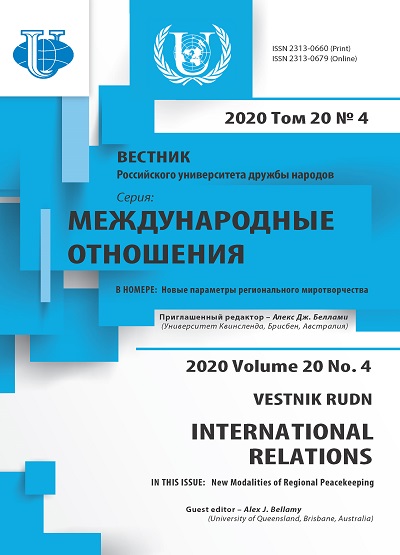Особенности участия ФРГ в миротворческих операциях в Африке на современном этапе
- Авторы: Ивкина Н.В.1
-
Учреждения:
- Российский университет дружбы народов
- Выпуск: Том 20, № 4 (2020): Новые параметры регионального миротворчества
- Страницы: 687-697
- Раздел: ТЕМАТИЧЕСКОЕ ДОСЬЕ
- URL: https://journals.rudn.ru/international-relations/article/view/25275
- DOI: https://doi.org/10.22363/2313-0660-2020-20-4-687-697
- ID: 25275
Цитировать
Полный текст
Аннотация
Статья посвящена изучению особенностей участия Германии в миротворческих операциях ООН, ЕС и НАТО в Африке. Актуальность темы исследования обусловлена противоречивостью мнений относительно необходимости сохранения и пролонгирования большинства операций в регионе. В связи с этим рассмотрены мнения экспертов, имеющих оптимистичные и пессимистичные взгляды на данную проблему, выделены этапы эволюции миротворческой деятельности. Целью исследования является доказательство состоятельности допущения критической теории об использовании странами миротворчества в качестве инструмента реализации своих внешнеполитических устремлений. На примере анализа германских усилий по наращиванию своего военного контингента в рамках миротворческих операций ООН и сохранению позиций (вопреки наличию оппозиционно настроенных представителей Парламента) в операциях ЕС и НАТО предлагается выявить причинно-следственные связи такого поведения государства. Для достижения поставленной цели использованы метод историзма, который помог выявить проблемы прошлого, от которых Германия посредством участия в операциях международных организаций пытается избавиться, а также метод сравнительного анализа, регулирующий сопоставление усилий Германии в миссиях с ее внешнеполитическими задачами. Анализ документов рассматриваемых международных организаций, а также законодательных актов и внешнеполитических доктрин Германии позволяет оценить не только законность проведения страной операций за пределами своих границ, но и выявить приоритеты внешней политики для получения достоверных результатов при сравнении. В заключении представлены выводы об эволюции усилий Германии в миссиях ООН, ЕС и НАТО в Африке и моделях поведения страны в операциях международных организаций. Результаты исследования отражают постулаты критической теории в процессе изучения миротворческой деятельности Германии в Африке.
Ключевые слова
Об авторах
Наталья Викторовна Ивкина
Российский университет дружбы народов
Автор, ответственный за переписку.
Email: ivkina-nv@rudn.ru
кандидат исторических наук, старший преподаватель кафедры теории и истории международных отношений
Москва, Российская ФедерацияСписок литературы
- Трунов Ф.О. Особенности участия Германии в урегулировании вооруженных конфликтов в Мали и Сомали // Актуальные проблемы Европы. 2018. № 4. С. 160-182.
- Bretherton C., Vogler J. The European Union as a Global Actor. Abingdon: Routledge, 2006.
- Duchene F. The European Community and the Uncertainties of Interdependence. A Nation Writ Large? London: Palgrave Macmillan, 1973.
- Duffield M. Global Governance and the New Wars: The Merging of Development and Security. London: Zed Books, 2001.
- Field M.R.V. The Brussels Summit: A Military Perspective // NATO Review. 1994. Vol. 42. No. 1. P. 7 -11. URL: https://www.nato.int/DOCU/review/1994/9401-2.htm (accessed: 12.08.2020).
- Greig J.M., Diehl P.D. The Peacekeeping-Peacemaking Dilemma // International Studies Quarterly. 2005. Vol. 49. No. 4. P. 621-645.
- Koops J.A. Germany and United Nations Peacekeeping: The Cautiously Evolving Contributor // International Peacekeeping. 2016. Vol. 23. No. 5. P. 652-680. doi: 10.1080/13533312.2016.1235092
- Koops J.A. The European Union as an Integrative Power: Assessing the EU’s “Effective Multilateralism” with NATO and the United Nations. Brussels: Vubpress, 2011.
- Manners I. The Concept of Normative Power in World Politics // Danish Institute for International Studies. 2009. URL: http://pure.diis.dk/ws/files/68745/B09_maj_Concept_Normative_Power_World_ (accessed: 01.03.2019).
- Merlingen M., Ostrauskaite R. European Union Peacebuilding and Policing. Governance and the European Security and Defence Policy. Routledge, 2006.
- Paquez A.-S. La politique de la France au Kosovo était-elle “gaulliste”? Institut européen de l’Université de Genève, 2003.
- Poopuu B. The European Union’s Brand of Peacebuilding. Palgrave Macmillan, 2020.
- Pugh M. Peacekeeping and Critical Theory // International Peacekeeping. 2004. Vol. 11. No. 1. Р. 39-58.
- Pugh M. The Political Economy of Peacebuilding: A Critical Theory Perspective // International Journal of Peace Studies. 2005. Vol. 10. No. 2. P. 23-42.
- Richmond O.P. The European Approach to Peacebuilding. Palgrave Macmillan, 2014.
- Stein T. Germany’s Constitution and Participation in International Peacekeeping Operations // Asia-Pacific Review. 2000. Vol. 7. Iss. 2. P. 33-40.
- Tardy T. Peace Operations in World Politics after 11 September 2001. London: Frank Cass, 2004.
- Weber H. Retour sur la guerre du Kosovo. Entretien avec Hubert Védrine // La revue socialiste. 1999. Vol. 10. No. 2. P. 22-43.
- Whitman R.G. From Civilian Power to Superpower? The International Identity of the European Union. London: Palgrave Macmillan, 1998.
- Wittig P. Deutschland als aktive Friedensmacht Plädoyer für die Unterstützung des UNO- Peacekeeping // Zeitschrift für Politik, Neue Folge. 2008. Vol. 55. No. 4. P. 435-443.
Дополнительные файлы










